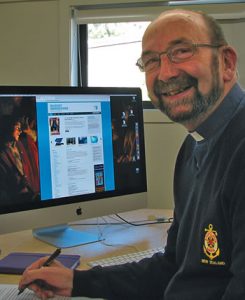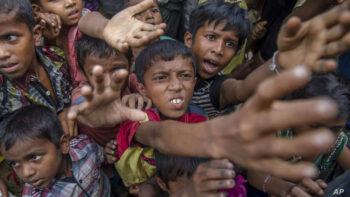World Day of the Poor – 15 November
The late Bishop John Mackey of Auckland is quoted as often saying, “It’s a sad and sinful world”, and it is. Much sadness is a consequence of poverty, and much poverty results from greed and sinfulness.
Even though “humankind cannot bear very much reality” (T S Eliot, Four Quartets), we need to be aware of what is happening in the world. Otherwise, there is no way in which we can do our part, no matter how small, in making the world a better place.
§ In November 2018, a World Bank report stated that 8.6% of people on earth, or 736 million people, live in extreme poverty on $1.90 (NZD2.84) or less a day.
§ According to a Credit Suisse report in November 2017, the wealthiest one per cent of the world’s population owned more than half of the world’s wealth (CNBC).
Among the sad situations of people living in poverty at present are these, among many others:
§ More than 700,000 Rohingya fled Myanmar three years ago as a consequence of vicious violence which the United Nations described as a “textbook example of ethnic cleansing” (UN, 11 September 2017). Now, “an estimated 108,037 mostly Rohingya children have been born in confinement in Bangladesh and Myanmar. They are living in conditions not suitable for children, with limited access to education and healthcare, no freedom of movement, and almost entirely dependent on aid” (Zenit, 27 August 2020).
§ The Chinese government continues to persecute and oppress the Uyghur people in China’s west, condemning them to live in poverty, and forcing women to be sterilised.
§ The State of Food Security and Nutrition in the World Report by the UN in July 2020 estimates that between 778 to 828 million people may go hungry this year. UN researchers say that the pandemic could see another 395 million people plunged into extreme poverty.
§ In Australia more than 3.24 million people (13.6%), including 774,000 children under 15 (17.7%), are living below the poverty line (UNSW Sydney, 20 Feb 2020).
§ In 2017, research by the Child Poverty Monitor in New Zealand found that 290,000 children – about 27 per cent – were living in income poverty. UNICEF defines child poverty as children being deprived of the material, spiritual and emotional resources needed to survive, develop and thrive (UNICEF).
In his message for the World Day of the Poor, Pope Francis wrote:
Encountering the poor and those in need constantly challenges us and forces us to think. How can we help to eliminate or at least alleviate their marginalisation and suffering? How can we help them in their spiritual need? The Christian community is called to be involved in this kind of sharing and to recognise that it cannot be delegated to others. To help the poor, we need to live the experience of evangelical poverty. We cannot feel ‘alright’ when any member of the human family is left behind and in the shadows. [#4]
In #5 of the same document the Pope wrote, Bad news fills the pages of newspapers, websites, and television screens, to the point that evil seems to reign supreme. But that is not the case. To be sure, malice and violence, abuse, and corruption abound. Still, life is interwoven too with acts of respect and generosity that not only compensate for evil but inspire us to take an extra step and fill our hearts with hope.
In the face of the world’s sadness, and aware of so many people living in desperate poverty, how can one not be sad? The sadness of a small hungry child in Syria or Bangladesh or western China, belongs to each of us, as does the misery of a homeless person anywhere dying on the street. In Devotions upon Emergent Occasions, John Donne (1572-1631) wrote, No man is an island entire of itself; every man is a piece of the continent, a part of the main; if a clod be washed away by the sea, Europe is the less, as well as if a promontory were … anyone’s death diminishes me, because I am involved in humankind. And therefore, never send to know for whom the bell tolls; it tolls for thee.
Just as anyone’s death diminishes me, so does anyone’s poverty.
As individuals, we do not have the resources to alleviate the world’s poverty, but all of us can do something – and we must. As St Teresa of Kolkata said, “if you cannot feed a hundred hungry people, feed one”.


 Entries(RSS)
Entries(RSS)